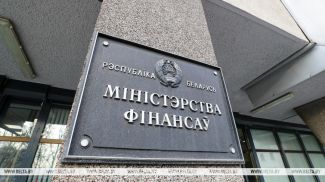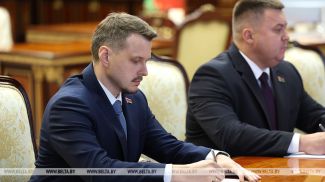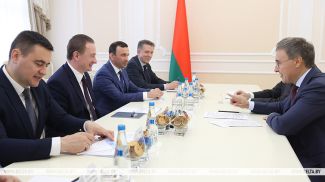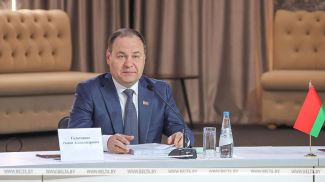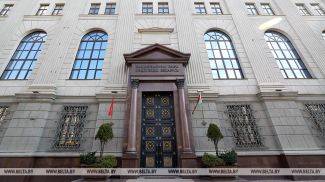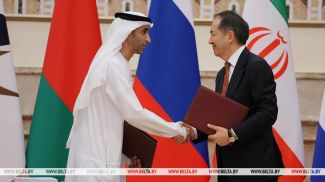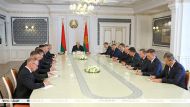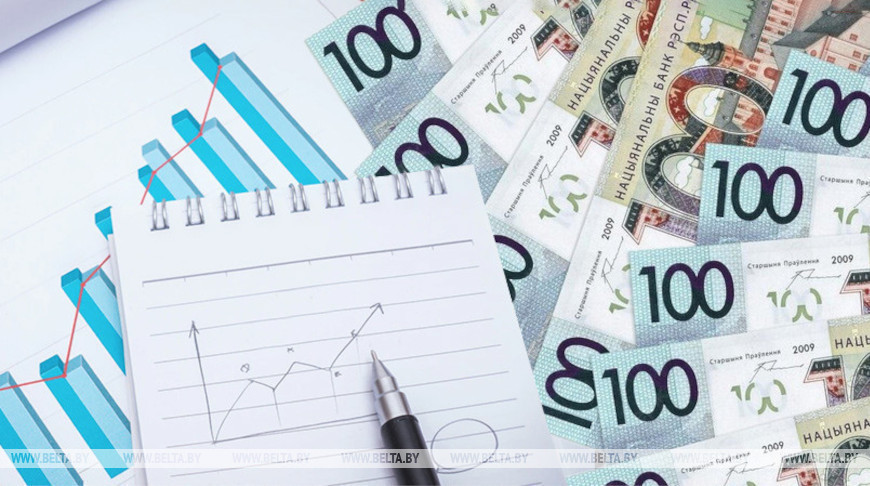
An archive photo
MINSK, 1 April (BelTA) – The Development Bank of the Republic of Belarus increased financing of the domestic economy by almost a quarter in 2023, the bank’s press service told BelTA following a joint meeting of the Supervisory Board and the General Meeting of Shareholders.
First Deputy Chairman of the Board of the Development Bank Roman Brodov emphasized that the bank is focused on fulfilling the tasks set by the head of state and the government. “Last year, the bank met all the targets set by the Supervisory Board. Moreover, in addition to fulfilling the quantitative indicators, the bank addressed qualitative tasks related to providing comprehensive support to the economy. In 2023, the amount of financing of the economy increased by 24%, and its ratio to GDP rose from 4.8% to 5.4%,” he said.
The main areas of work of the Development Bank in 2023 were investments, exports and support for small and medium-sized businesses. The bank allocated funds that were 13% above the plan to finance investment projects. The segment of commercial investment projects grew 1.5 times. This year the biggest share of investments is expected to go to infrastructure projects.
In 2023, the Development Bank provided export loans to Belarusian companies for the production of goods, works, services and their subsequent sale to foreign markets, as well as directly to non-resident borrowers to pay for Belarusian goods and services. The bank’s export loan portfolio expanded by 65%. In line with Decree No. 534, the bank provided support to more than 100 borrowers to finance the export of more than 100 names of goods. “We believe that the most important outcome of export support is the structuring of transactions using the signature style of the Development Bank, which is focused on achieving socio-economic development goals. This is maximum effect with minimal investment,” said Roman Brodov.
He also touched upon small organizations and enterprises for which government support can be a significant boost. “The Development Bank contributed every tenth ruble to banks’ long-term loan portfolio to finance SMEs,” noted Roman Brodov.
As far as the structure of financial support provided to SMEs is concerned, investment projects account for two thirds of the financed projects (86% of them were implemented in the manufacturing sector). About 40% of projects were launched in under-performing areas. As a result of efforts to support SMEs, the average annual increase in stuff numbers was 12% and revenue 39% at the organizations that received funding. These results are significantly better than the average results posted by the SME sector.
This year, the bank will continue to put in a lot of effort to provide comprehensive support to the country's economy. “I would like to give credit for good performance in 2023 to the bank’s team under the leadership of Aleksandr Yegorov and government bodies that help us address unconventional tasks,” Roman Brodov noted.
The participants of the joint meeting clarified their tasks and formed new compositions of the Supervisory Board of the Development Bank and its committees.
First Deputy Chairman of the Board of the Development Bank Roman Brodov emphasized that the bank is focused on fulfilling the tasks set by the head of state and the government. “Last year, the bank met all the targets set by the Supervisory Board. Moreover, in addition to fulfilling the quantitative indicators, the bank addressed qualitative tasks related to providing comprehensive support to the economy. In 2023, the amount of financing of the economy increased by 24%, and its ratio to GDP rose from 4.8% to 5.4%,” he said.
The main areas of work of the Development Bank in 2023 were investments, exports and support for small and medium-sized businesses. The bank allocated funds that were 13% above the plan to finance investment projects. The segment of commercial investment projects grew 1.5 times. This year the biggest share of investments is expected to go to infrastructure projects.
In 2023, the Development Bank provided export loans to Belarusian companies for the production of goods, works, services and their subsequent sale to foreign markets, as well as directly to non-resident borrowers to pay for Belarusian goods and services. The bank’s export loan portfolio expanded by 65%. In line with Decree No. 534, the bank provided support to more than 100 borrowers to finance the export of more than 100 names of goods. “We believe that the most important outcome of export support is the structuring of transactions using the signature style of the Development Bank, which is focused on achieving socio-economic development goals. This is maximum effect with minimal investment,” said Roman Brodov.
He also touched upon small organizations and enterprises for which government support can be a significant boost. “The Development Bank contributed every tenth ruble to banks’ long-term loan portfolio to finance SMEs,” noted Roman Brodov.
As far as the structure of financial support provided to SMEs is concerned, investment projects account for two thirds of the financed projects (86% of them were implemented in the manufacturing sector). About 40% of projects were launched in under-performing areas. As a result of efforts to support SMEs, the average annual increase in stuff numbers was 12% and revenue 39% at the organizations that received funding. These results are significantly better than the average results posted by the SME sector.
This year, the bank will continue to put in a lot of effort to provide comprehensive support to the country's economy. “I would like to give credit for good performance in 2023 to the bank’s team under the leadership of Aleksandr Yegorov and government bodies that help us address unconventional tasks,” Roman Brodov noted.
The participants of the joint meeting clarified their tasks and formed new compositions of the Supervisory Board of the Development Bank and its committees.




